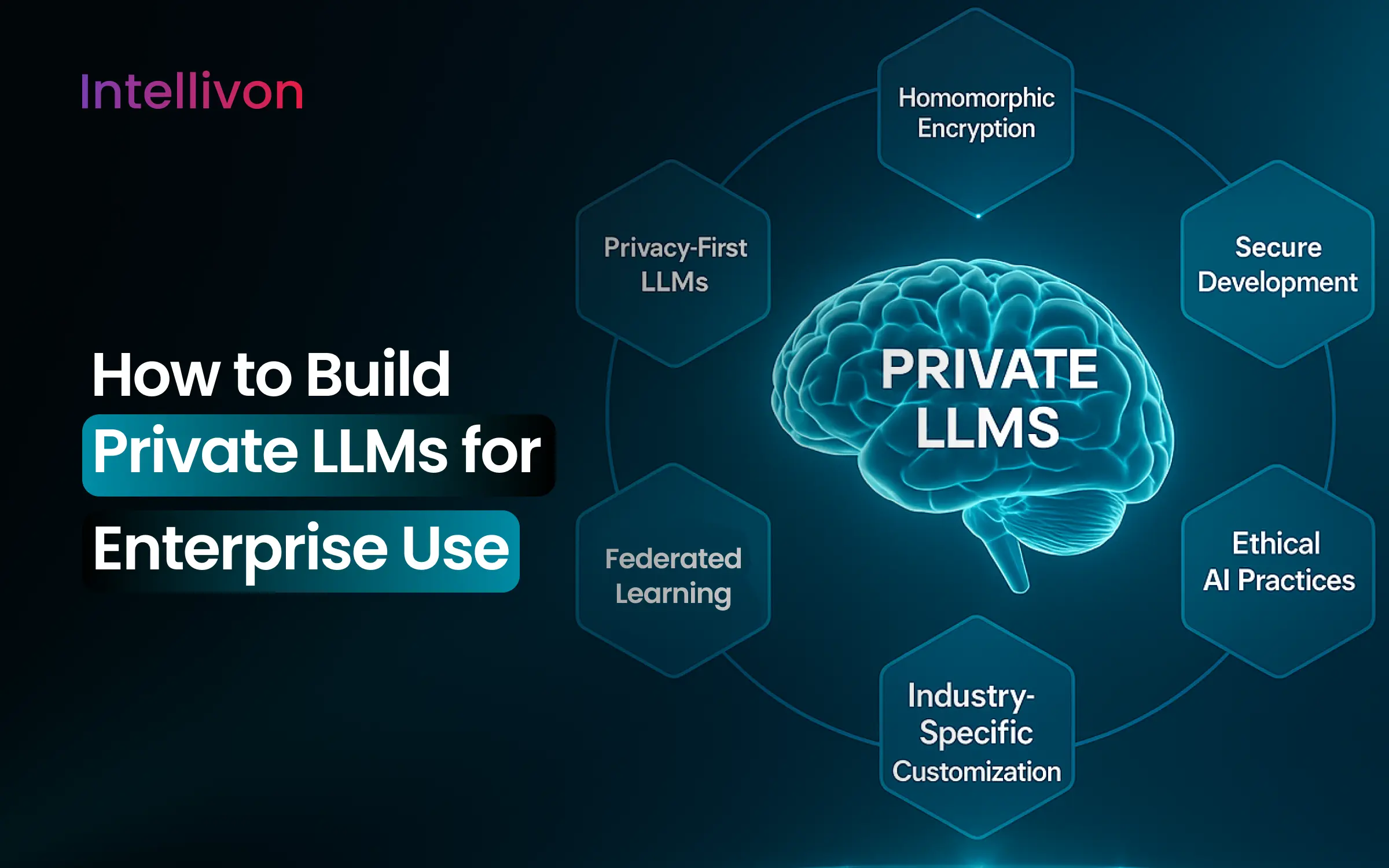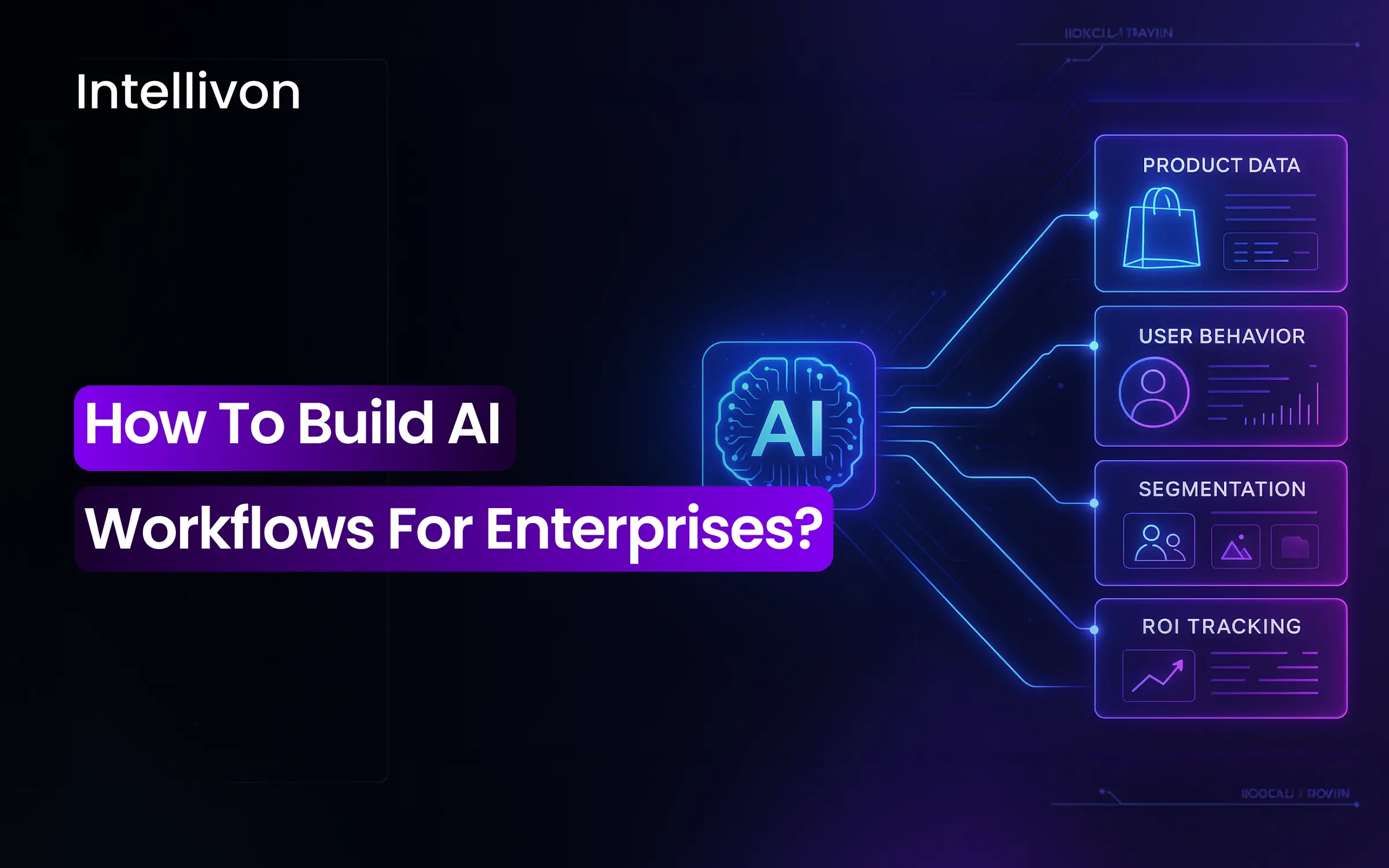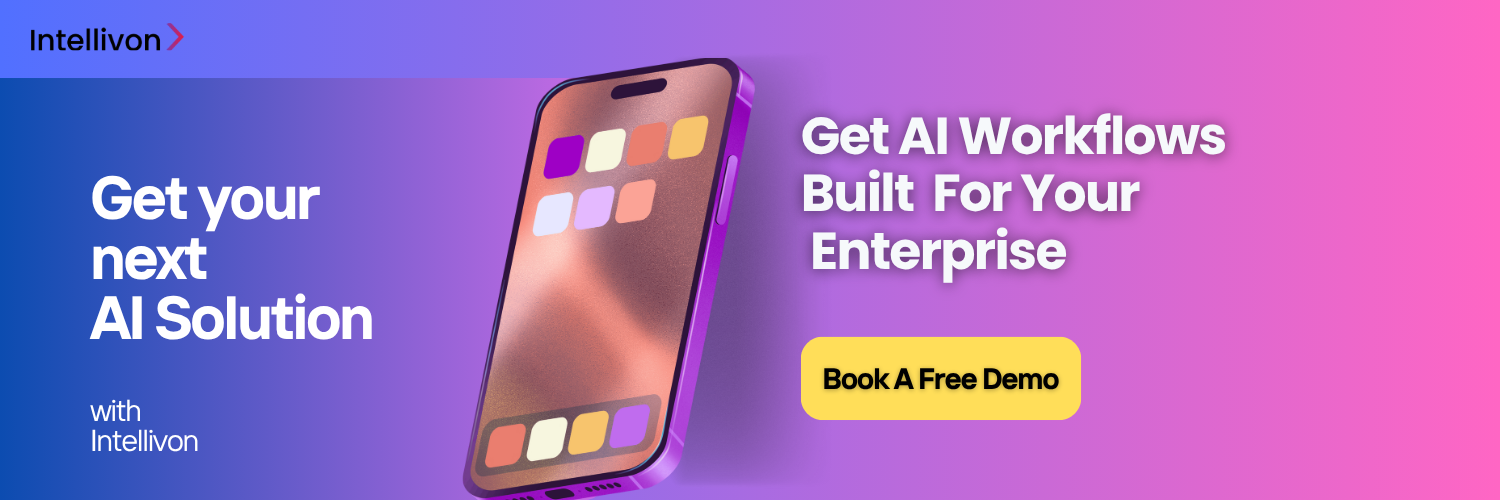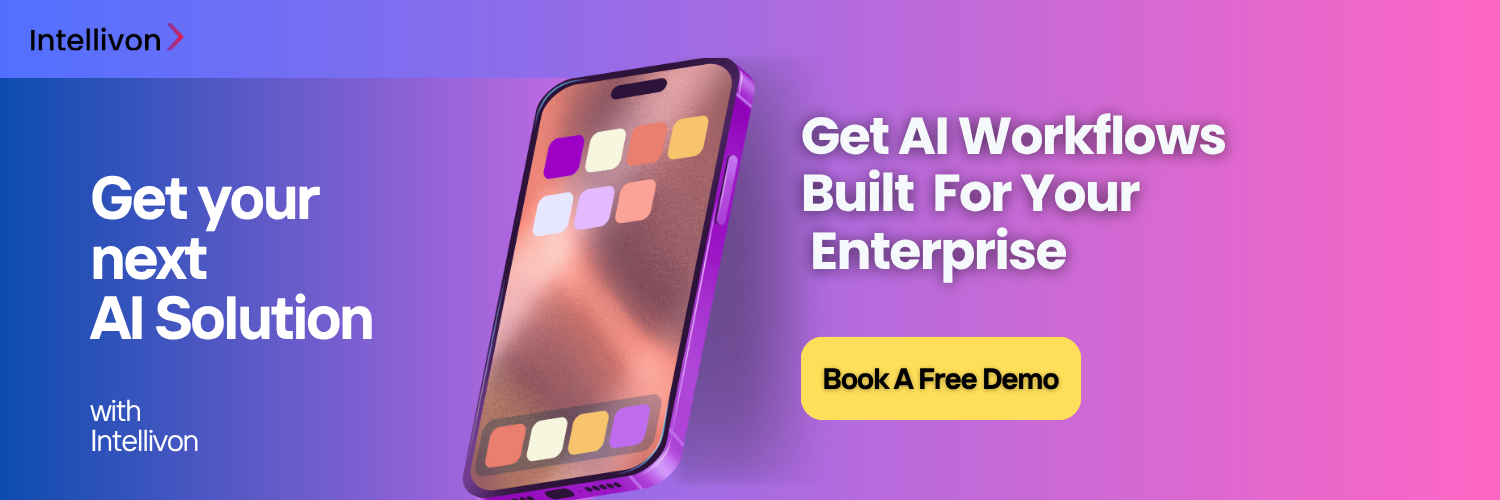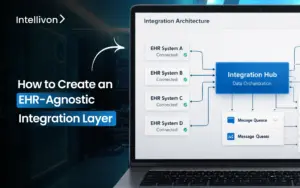If your enterprise is still dependent on manual workflows, you are seriously lagging behind. 80% of enterprises out there are already leveraging AI to automate all their workflows, leading to faster, accurate results at half the operational costs.
Take, for instance, Deloitte, one of the Big 4 accounting firms, with AI, they have reduced management report prep time from 5-8 days to 1 hour. Or even the Colombian multinational financial services holding company, Bancolombia, that saved 127,000 hours annually and reduced provisioning costs by $19M by using AI in their workflows. These enterprise trailblazers are paving the way for 100% AI-automated workflow environments, and others are already following suit.
But how do leading enterprises actually build these intelligent workflows? What does it take to move from manual processes to a fully automated, AI-driven operation? In this blog, we’ll unlock the secrets behind AI workflow automation for enterprises, exploring proven strategies, real-world success stories, and the step-by-step blueprint to help your organization harness the full power of AI. Intellivon’s cutting-edge AI solutions have helped over 50 enterprises to automate workflows and achieve scalable real-world impact.
Why AI Workflows Are Crucial for Enterprise Success

Some other staggering market insights surrounding the AI Workflow Automation market includes:
- Market Growth: The global workflow automation market is growing rapidly, with a projected increase of 21.55% annually.
- Market Size: The market was valued at $19.76 billion in 2023 and is expected to reach $51.19 billion by 2030, and $45.49 billion by 2032.
- Investor Interest: Over 2,600 investors have participated in more than 2,800 funding rounds, with the average round size being $8.4 million.
- Productivity Boost: Industries that have heavily integrated AI workflows report up to 4.8 times greater labor efficiency growth compared to others.
- Error Reduction: AI-driven automation can cut human errors by nearly 50%, improving overall accuracy and performance.
- Cost & Revenue Impact: Businesses see an impressive return on investment (ROI), ranging from 30% to 200%, within the first year of adopting AI workflow automation.
Here are some reasons why integrating AI workflows for enterprises is crucial right now:
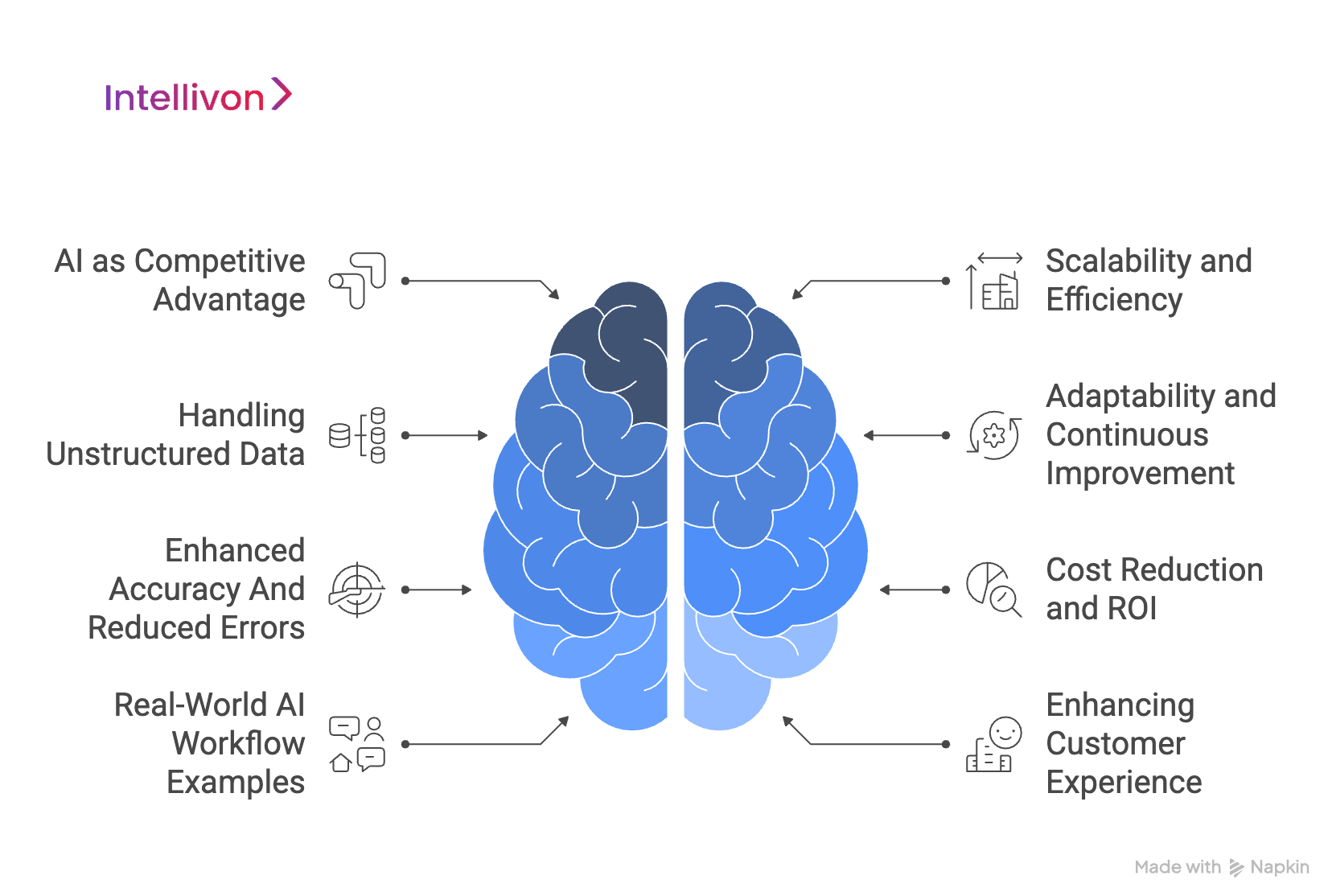
1. AI as a Competitive Advantage
AI workflows allow businesses to automate both routine and complex tasks, helping them outpace competitors. Unlike traditional automation, AI adapts to evolving needs, processes unstructured data, and delivers personalized customer experiences. Enterprises that adopt AI-driven workflows gain a significant edge, providing faster, more efficient services in a data-driven market.
2. Scalability and Efficiency
AI workflows are scalable, enabling businesses to extend automation across various departments and regions seamlessly. Cloud-based AI platforms dynamically adjust resources to match demand. This scalability, combined with AI’s ability to automate high-volume tasks, frees up human resources for strategic work, boosting productivity and operational efficiency.
3. Handling Unstructured Data
AI workflows excel at managing unstructured data like emails, voice conversations, and free-form text, which traditional automation tools can’t handle. AI improves decision-making by analyzing both historical and real-time data, optimizing processes like resource allocation, risk assessment, and exception handling.
4. Adaptability and Continuous Improvement
AI workflows are not static. Unlike rule-based systems, AI continuously evolves with new data and changing business environments. This adaptability ensures that enterprises can optimize workflows over time, staying agile and competitive in a fast-moving business world.
5. Enhanced Accuracy and Reduced Errors
AI-driven automation reduces human error in tasks like data entry, compliance checks, and financial transactions. By ensuring more accurate and reliable operations, AI minimizes costly mistakes and enhances operational efficiency.
6. Cost Reduction and ROI
AI workflows help businesses lower operational costs by automating labor-intensive tasks and improving resource allocation. Many enterprises report a return on investment within a year of AI implementation, with cost reductions of up to 10% and revenue growth of more than 10%.
7. Real-World AI Workflow Examples
- HSBC: Implemented AI to improve financial crime detection, increasing risk detection by 2–4 times and reducing false positives by over 60%.
- Kent Community Health NHS Foundation Trust: Saved £700,000 and freed up 45,000 hours by automating administrative workflows with AI.
- Vale: Automated processes for a 234,000-person workforce, saving 121,000 hours and $5 million annually.
- Coca-Cola: Used AI-powered marketing tools to optimize campaigns, boosting customer engagement and efficiency.
8. Enhancing Customer Experience
AI-powered chatbots and virtual agents provide personalized, instant support, improving customer satisfaction and loyalty. This application of AI automation is especially valuable in industries like retail and telecom, where fast personalized service is critical to customer retention.
Key Components of Building Effective AI Workflows for Enterprises
Building AI workflows in enterprise environments requires a thoughtful approach to integrating various technologies and data sources. Below are the key components that make AI workflows in enterprise settings not just effective but transformative for business operations.
1. Data Integration
Integrating data from sources like databases, ERP systems, CRM systems, cloud platforms, and IoT devices is critical for AI workflows in enterprise environments. Simplifying this process with AI-powered ETL (extract, transform, load) pipelines and intelligent data cataloging ensures a secure and scalable data flow across platforms. This also eliminates data silos and maintaining high-quality, ready-to-process data for AI systems.
2. Automation of Repetitive Tasks
AI workflows in enterprise settings excel at automating repetitive tasks such as data entry, invoice processing, and report generation. By leveraging advanced workflow engines, Intellivon helps enterprises reduce manual errors and speed up processes, freeing employees to focus on strategic initiatives. Automation is integrated directly into existing business applications, ensuring consistency and efficiency in task handling.
3. Machine Learning Models
Machine learning models form the core intelligence of AI workflows, allowing systems to adapt and predict outcomes based on enterprise-specific data. Intellivon enables organizations to build, train, and deploy custom machine learning models tailored to their unique needs. These models continuously evolve through automated retraining, ensuring their relevance and accuracy as business conditions change.
4. NLP for Enhanced Communication
NLP enables AI systems to understand, interpret, and respond to human language, transforming both internal and external communication. Enterprises can deploy AI-powered conversational agents for customer support, automate email triage, and enhance knowledge management, which improves customer interactions and streamlines internal communication processes.
5. Advanced Analytics and Visualization
Effective AI workflows rely on intuitive dashboards and analytics tools that transform complex data into actionable insights. Real-time visualizations empower decision-makers at all levels, helping them leverage AI for smarter strategic planning and operational improvements.
6. Collaboration and Customization Tools
No-code and low-code platforms allow both technical and non-technical users to quickly build, refine, and deploy AI workflows. These collaborative development tools help domain experts and IT teams co-create solutions that align with enterprise goals, ensuring that AI workflows are fully customized to meet specific business needs.
How We Build AI Workflows in Enterprises: 7-Step Framework
We follow a proven 7-step process to build AI workflows that align with your enterprise goals, optimize efficiency, and drive growth. By leveraging advanced AI technologies and seamless integration, we ensure that your enterprise achieves the best results with every AI solution.
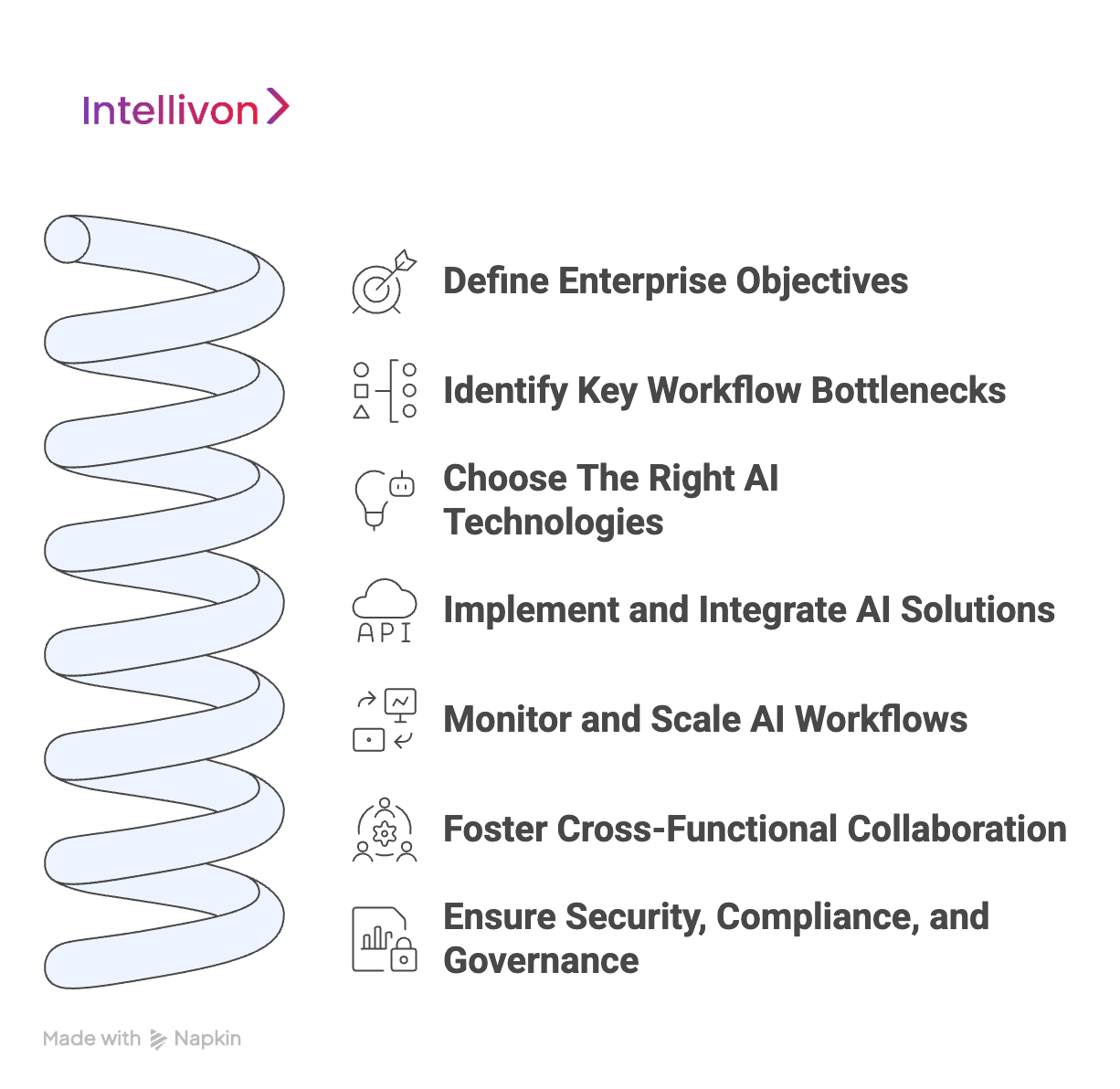
Step 1: Define Enterprise Objectives
The first and most crucial step in building effective AI workflows is ensuring they align with your enterprise’s broader business strategy. This alignment ensures that every AI initiative directly supports your key business goals.
Whether the focus is on enhancing customer service, improving sales forecasting, optimizing supply chain management, or increasing productivity, it’s vital to understand how AI can contribute.
For example, if improving customer service is the objective, AI can be leveraged to automate ticket triage or deploy personalized support through chatbots. This clarity sets the stage for designing AI workflows that provide measurable business value by aligning with both short-term goals and long-term strategic vision.
Step 2: Identify Key Workflow Bottlenecks
Effective AI workflows in enterprise settings require a deep understanding of where inefficiencies lie in current workflows. Identifying bottlenecks can reveal high-impact automation opportunities.
AI tools like process mining and analytics can be used to map out existing workflows, allowing businesses to identify areas such as manual data entry or slow approval processes that are ripe for automation.
Prioritizing these areas ensures that AI interventions bring the greatest return on investment and operational improvements.
Step 3: Choose the Right AI Technologies
Selecting the right AI technologies is essential to the success of AI workflows. The right tools will depend on the specific challenges your enterprise faces.
- ML can be used to provide predictive insights, such as forecasting demand or customer behavior
- NLP can streamline customer service by automating responses to queries.
- RPA is another tool that helps automate repetitive tasks.
Choosing the right mix of technologies ensures that your AI workflows not only solve the identified pain points but are also optimized for scalability as your business grows. Integration with existing systems, such as CRMs or ERP platforms, is key to making sure that AI tools work seamlessly within your current technology stack.
Step 4: Implement and Integrate AI Solutions
The successful implementation of AI workflows depends on seamless integration with existing business systems. This process needs to be planned carefully to avoid disruptions to ongoing operations. AI solutions should be deployed incrementally to allow for adjustments and to ensure smooth adaptation.
For example, an AI-powered sales forecasting tool can be integrated with your existing CRM without the need for a complete overhaul of your current infrastructure. The goal is to tailor AI workflows to fit the specific needs of your organization, ensuring that each system works together efficiently.
Continuous feedback during the integration process allows for refinements and ensures that AI solutions are properly aligned with business objectives.
Step 5: Monitor and Scale AI Workflows
Once AI workflows are in place, monitoring their performance is essential to ensure they remain effective and efficient over time. Tracking key metrics like speed, accuracy, and cost-effectiveness helps identify areas that need improvement.
AI systems should also be continuously refined to adapt to changing business conditions. Machine learning models, for example, can be retrained regularly to improve prediction accuracy based on new data.
As your business grows, so too should your AI capabilities. Scaling AI workflows across different departments or regions ensures that the benefits of automation extend throughout the organization, increasing overall productivity and enabling the enterprise to respond quickly to new opportunities.
Step 6: Foster Cross-Functional Collaboration
AI adoption in enterprises requires collaboration across various departments, including IT, operations, and business teams. This cross-functional collaboration ensures that everyone is aligned and involved in the implementation process.
Engaging all stakeholders from the beginning helps to define the scope and goals of AI workflows while fostering a culture of cooperation. Effective training programs are also essential to help employees adapt to new AI tools, whether they are technical users or business managers.
Change management is key to ensuring that employees embrace the new systems, and feedback loops play an important role in continuously refining AI solutions.
Step 7: Ensure Security, Compliance, and Governance
In any enterprise, security and compliance are top priorities, especially when dealing with sensitive data. For AI workflows to succeed, they must be built with strong data governance, ensuring that all AI-driven decisions are traceable, transparent, and comply with regulatory standards.
Industries such as healthcare, finance, and e-commerce have specific legal and privacy concerns, such as GDPR or HIPAA, which must be addressed during AI implementation. Implementing robust security protocols, including encryption and access controls, helps to protect sensitive information and builds trust in AI systems.
By embedding compliance and governance frameworks into AI workflows, enterprises can confidently scale their AI operations without compromising on data security or legal standards.
Cost of Building AI Workflows for Enterprises
Below is an estimated breakdown of costs to give enterprises a general understanding of what building AI workflows might involve.
| Component | Cost Estimate (USD) | Details |
| 1. Initial Consultation & Planning | $5,000 – $10,000 | Includes requirements gathering, defining AI objectives, aligning with business goals, and initial consultations. |
| 2. Data Integration & Preprocessing | $10,000 – $20,000 | Integrating key data sources (databases, ERP, CRM) and ensuring the data is AI-ready, high-quality, and well-governed. |
| 3. AI Model Development | $10,000 – $25,000 | Developing custom AI models (e.g., machine learning, NLP) tailored to business needs for tasks like customer segmentation or sales predictions. |
| 4. AI Software & Tools Licensing | $5,000 – $15,000 per year | Licensing fees for AI platforms and cloud-based tools (e.g., TensorFlow, AWS AI, Azure AI, etc.). |
| 5. AI Workflow Automation | $10,000 – $25,000 | Implementing AI workflows for task automation (e.g., invoicing, customer support) using RPA or ML tools. |
| 6. System Integration & Customization | $10,000 – $20,000 | Integrating AI solutions with existing business systems (ERP, CRM) and customization to meet specific needs. |
| 7. Testing & Quality Assurance | $5,000 – $10,000 | Testing AI workflows to ensure they are functioning as expected, including performance and validation. |
| 8. Training & Change Management | $5,000 – $10,000 | Training for employees on new AI tools and systems, plus change management support to ensure smooth adoption. |
| 9. Ongoing Monitoring & Optimization | $5,000 – $10,000 per year | Continuous monitoring of AI systems, with performance tracking and necessary adjustments to improve outcomes. |
| 10. Security & Compliance | $5,000 – $10,000 | Ensuring compliance with security regulations (e.g., GDPR, HIPAA) and implementing data governance best practices. |
Total Estimated Cost: $50,000 – $100,000
This is only a rough estimate of the approximate costs involved in building AI workflows for enterprises. To find out how much it will cost your enterprise to do the same, book a consultation call with us to get a tailored quote.
Overcoming Common Challenges in Building AI Workflows for Enterprises
Here are some common challenges enterprises face while building AI workflows, and the solutions we use to solve them:
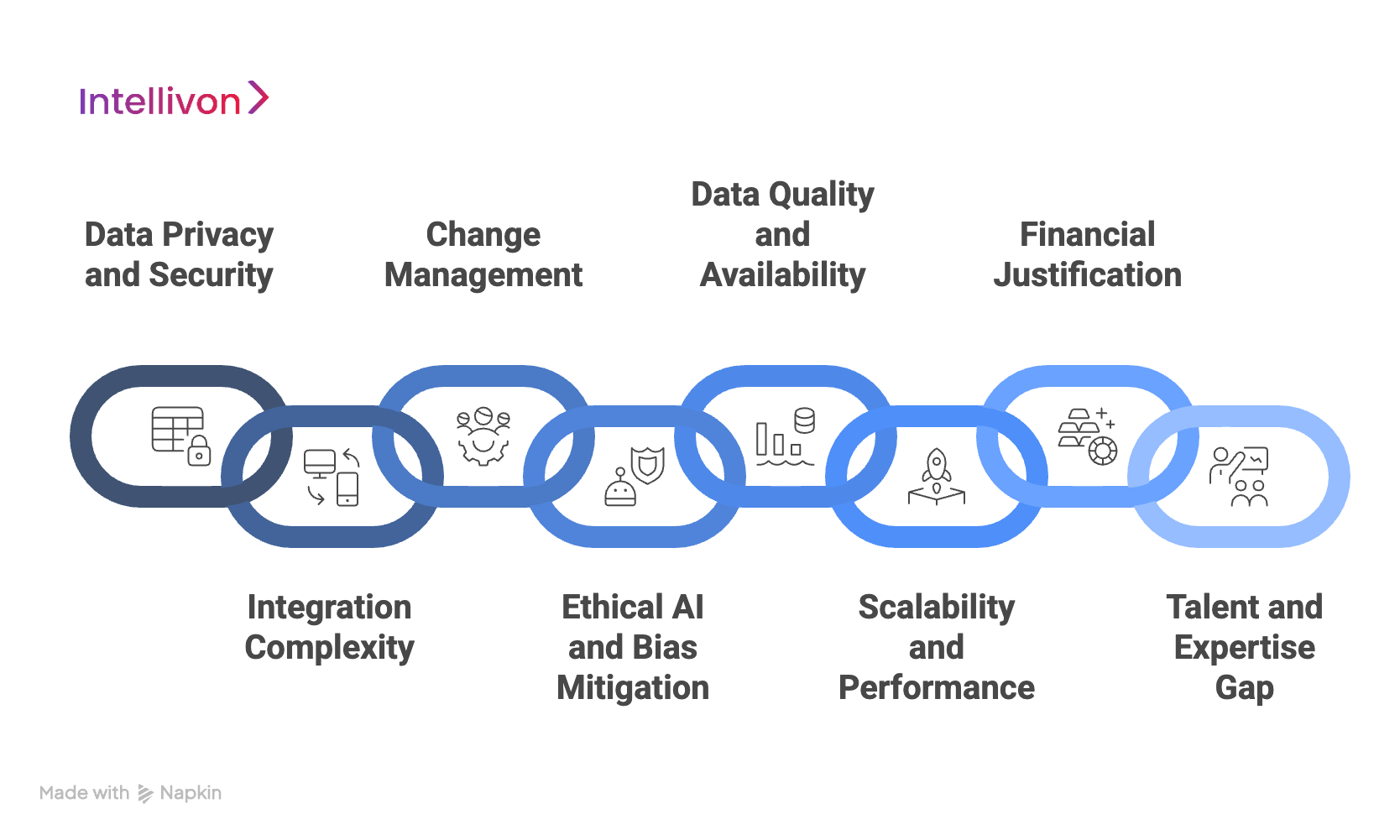
1. Data Privacy and Security
Challenge: When implementing AI workflows in enterprise environments, protecting sensitive data is crucial. Enterprises must comply with strict data protection regulations such as GDPR and CCPA, ensuring customer and proprietary data is safeguarded from breaches or misuse. Maintaining data privacy is not just a legal requirement; it also builds trust with customers and partners.
Solution: To address these concerns, AI systems need robust encryption, secure access controls, and detailed audit trails. Intellivon integrates these security features into every AI workflow, ensuring compliance and protecting sensitive information at all times. We also continuously monitor for emerging vulnerabilities, such as adversarial AI attacks, adapting our security protocols to stay ahead of potential threats.
2. Integration Complexity
Challenge: Integrating AI into legacy systems can often be a challenging process. Compatibility issues with older technologies or siloed data can slow down deployment and hinder the full benefits of AI. Many enterprises face delays, inefficiencies, and increased costs when trying to fit AI workflows into their existing infrastructure.
Solution: Intellivon’s approach minimizes these hurdles by offering end-to-end integration solutions. By leveraging flexible APIs, middleware, and cloud or hybrid architectures, we enable AI workflows to seamlessly connect with your current systems. This reduces disruption, accelerates deployment, and ensures that your business can quickly benefit from AI-driven workflows without the need for expensive system overhauls.
3. Change Management
Challenge: Adopting AI-driven workflows often comes with challenges such as employee resistance and uncertainty about the future of work. Some employees may view AI as a threat to their roles, leading to hesitation or reluctance to embrace the technology.
Solution: At Intellivon, we support leadership teams with tailored change management strategies that promote transparency, communication, and collaboration. We provide comprehensive training and focus on empowering employees by positioning AI as a tool that enhances their capabilities, rather than replacing them. By fostering a positive mindset around AI, we ensure a smooth transition and encourage the workforce to embrace AI-driven workflows confidently.
4. Additional Challenges and Our Approach
1. Ethical AI and Bias Mitigation
Challenge: AI models can sometimes unintentionally perpetuate bias, leading to unfair or unethical outcomes. This is a major concern when deploying AI in sensitive areas like hiring, customer service, or financial decision-making.
Solution: To mitigate these risks, Intellivon incorporates fairness and transparency frameworks throughout the AI development process. We continuously audit our models to detect and address any bias, ensuring that AI workflows remain ethical, transparent, and accountable.
2. Data Quality and Availability
Challenge: Effective AI relies on high-quality, diverse, and representative data. Poor or incomplete data can lead to inaccurate models and ineffective AI workflows. Enterprises often struggle with data silos, inconsistent formats, and data quality issues that hinder AI performance.
Solution: Intellivon works with enterprises to cleanse, enrich, and unify data sources, breaking down silos and ensuring that AI models are trained on reliable, representative datasets. This improves the accuracy and effectiveness of AI workflows, helping enterprises get the most out of their data.
3. Scalability and Performance
Challenge: As AI initiatives grow, ensuring that AI workflows maintain high performance across larger datasets and expanding teams is essential. Enterprises need scalable AI solutions that can handle increased workloads without compromising speed or accuracy.
Solution: We design scalable AI architectures using cloud and edge computing, ensuring that your AI workflows can scale efficiently across different departments and geographies. This ensures consistent performance, even as your business grows or expands into new markets.
4. Financial Justification
Challenge: Building AI workflows for enterprises requires a clear financial justification to secure investment and demonstrate ROI. Decision-makers need measurable outcomes that show how AI can contribute to business goals.
Solution: We partner with enterprises to develop pilot programs and measurable KPIs that demonstrate the tangible business impact of AI workflows. By showcasing the real-world value of AI initiatives, we help enterprises secure the necessary budget for full-scale AI adoption.
5. Talent and Expertise Gap
Challenge: There’s a shortage of skilled AI professionals, and many enterprises struggle to find the expertise needed to build and manage AI workflows in-house. This talent gap can hinder AI adoption and slow down progress.
Solution: To bridge this gap, Intellivon complements your team with expert consultants and offers training programs to upskill your workforce. This ensures that your team has the knowledge and skills to manage and maintain AI workflows, enabling sustainable AI adoption for the long term.
Why Ensuring Ethical AI Workflows Are Crucial For Data-Driven Enterprises
AI governance goes beyond just data privacy. It’s a comprehensive framework that ensures AI systems are developed and used in a manner that aligns with legal and ethical standards. In an enterprise setting, AI governance involves managing the entire AI lifecycle, from model development, deployment, and ongoing monitoring, to prevent issues like biased outcomes, unethical decision-making, and regulatory non-compliance.
With the increasing complexity of AI systems and their integration into core business functions, enterprises must have governance mechanisms in place that oversee every stage of AI’s deployment.
Why Robust AI Governance Matters
Having a strong AI governance framework builds trust with both customers and regulators by showing that the organization is committed to ethical and lawful use of AI.
It also helps avoid reputational damage, legal penalties, and loss of consumer confidence, which can result from biased or non-compliant AI systems.
A well-governed AI system fosters a culture of responsibility and innovation, empowering enterprises to scale AI technologies while managing risks effectively.
Additionally, enterprises with a robust AI governance framework can more easily adapt to evolving legal standards, staying ahead of new regulations and ensuring that AI workflows remain compliant over time.
Ethical AI in Practice: Ensuring Responsible AI Workflows
Ethical AI is a necessary foundation for ensuring AI systems deliver value without unintended negative consequences. To implement responsible AI workflows, Intellivon focuses on these key areas:
1. Data Privacy and Security
Challenge: When implementing AI workflows in enterprise environments, protecting sensitive data is crucial. Enterprises must comply with strict data protection regulations such as GDPR and CCPA, ensuring customer and proprietary data is safeguarded from breaches or misuse. Maintaining data privacy is not just a legal requirement; it also builds trust with customers and partners.
Solution: To address these concerns, AI systems need robust encryption, secure access controls, and detailed audit trails. Intellivon integrates these security features into every AI workflow, ensuring compliance and protecting sensitive information at all times. We also continuously monitor for emerging vulnerabilities, such as adversarial AI attacks, adapting our security protocols to stay ahead of potential threats.
2. Integration Complexity
Challenge: Integrating AI into legacy systems can often be a challenging process. Compatibility issues with older technologies or siloed data can slow down deployment and hinder the full benefits of AI. Many enterprises face delays, inefficiencies, and increased costs when trying to fit AI workflows into their existing infrastructure.
Solution: Intellivon’s approach minimizes these hurdles by offering end-to-end integration solutions. By leveraging flexible APIs, middleware, and cloud or hybrid architectures, we enable AI workflows to seamlessly connect with your current systems. This reduces disruption, accelerates deployment, and ensures that your business can quickly benefit from AI-driven workflows without the need for expensive system overhauls.
3. Change Management
Challenge: Adopting AI-driven workflows often comes with challenges such as employee resistance and uncertainty about the future of work. Some employees may view AI as a threat to their roles, leading to hesitation or reluctance to embrace the technology.
Solution: At Intellivon, we support leadership teams with tailored change management strategies that promote transparency, communication, and collaboration. We provide comprehensive training and focus on empowering employees by positioning AI as a tool that enhances their capabilities, rather than replacing them. By fostering a positive mindset around AI, we ensure a smooth transition and encourage the workforce to embrace AI-driven workflows confidently.
4. Additional Challenges and Our Approach
1. Ethical AI and Bias Mitigation
Challenge: AI models can sometimes unintentionally perpetuate bias, leading to unfair or unethical outcomes. This is a major concern when deploying AI in sensitive areas like hiring, customer service, or financial decision-making.
Solution: To mitigate these risks, Intellivon incorporates fairness and transparency frameworks throughout the AI development process. We continuously audit our models to detect and address any bias, ensuring that AI workflows remain ethical, transparent, and accountable.
2. Data Quality and Availability
Challenge: Effective AI relies on high-quality, diverse, and representative data. Poor or incomplete data can lead to inaccurate models and ineffective AI workflows. Enterprises often struggle with data silos, inconsistent formats, and data quality issues that hinder AI performance.
Solution: Intellivon works with enterprises to cleanse, enrich, and unify data sources, breaking down silos and ensuring that AI models are trained on reliable, representative datasets. This improves the accuracy and effectiveness of AI workflows, helping enterprises get the most out of their data.
3. Scalability and Performance
Challenge: As AI initiatives grow, ensuring that AI workflows maintain high performance across larger datasets and expanding teams is essential. Enterprises need scalable AI solutions that can handle increased workloads without compromising speed or accuracy.
Solution: We design scalable AI architectures using cloud and edge computing, ensuring that your AI workflows can scale efficiently across different departments and geographies. This ensures consistent performance, even as your business grows or expands into new markets.
4. Financial Justification
Challenge: Building AI workflows for enterprises requires a clear financial justification to secure investment and demonstrate ROI. Decision-makers need measurable outcomes that show how AI can contribute to business goals.
Solution: We partner with enterprises to develop pilot programs and measurable KPIs that demonstrate the tangible business impact of AI workflows. By showcasing the real-world value of AI initiatives, we help enterprises secure the necessary budget for full-scale AI adoption.
5. Talent and Expertise Gap
Challenge: There’s a shortage of skilled AI professionals, and many enterprises struggle to find the expertise needed to build and manage AI workflows in-house. This talent gap can hinder AI adoption and slow down progress.
Solution: To bridge this gap, Intellivon complements your team with expert consultants and offers training programs to upskill your workforce. This ensures that your team has the knowledge and skills to manage and maintain AI workflows, enabling sustainable AI adoption for the long term.
Why Ensuring Ethical AI Workflows Are Crucial For Data-Driven Enterprises
AI governance goes beyond just data privacy. It’s a comprehensive framework that ensures AI systems are developed and used in a manner that aligns with legal and ethical standards. In an enterprise setting, AI governance involves managing the entire AI lifecycle, from model development, deployment, and ongoing monitoring, to prevent issues like biased outcomes, unethical decision-making, and regulatory non-compliance.
With the increasing complexity of AI systems and their integration into core business functions, enterprises must have governance mechanisms in place that oversee every stage of AI’s deployment.
Why Robust AI Governance Matters
Having a strong AI governance framework builds trust with both customers and regulators by showing that the organization is committed to ethical and lawful use of AI.
It also helps avoid reputational damage, legal penalties, and loss of consumer confidence, which can result from biased or non-compliant AI systems.
A well-governed AI system fosters a culture of responsibility and innovation, empowering enterprises to scale AI technologies while managing risks effectively.
Additionally, enterprises with a robust AI governance framework can more easily adapt to evolving legal standards, staying ahead of new regulations and ensuring that AI workflows remain compliant over time.
Ethical AI in Practice: Ensuring Responsible AI Workflows
Ethical AI is a necessary foundation for ensuring AI systems deliver value without unintended negative consequences. To implement responsible AI workflows, Intellivon focuses on these key areas:
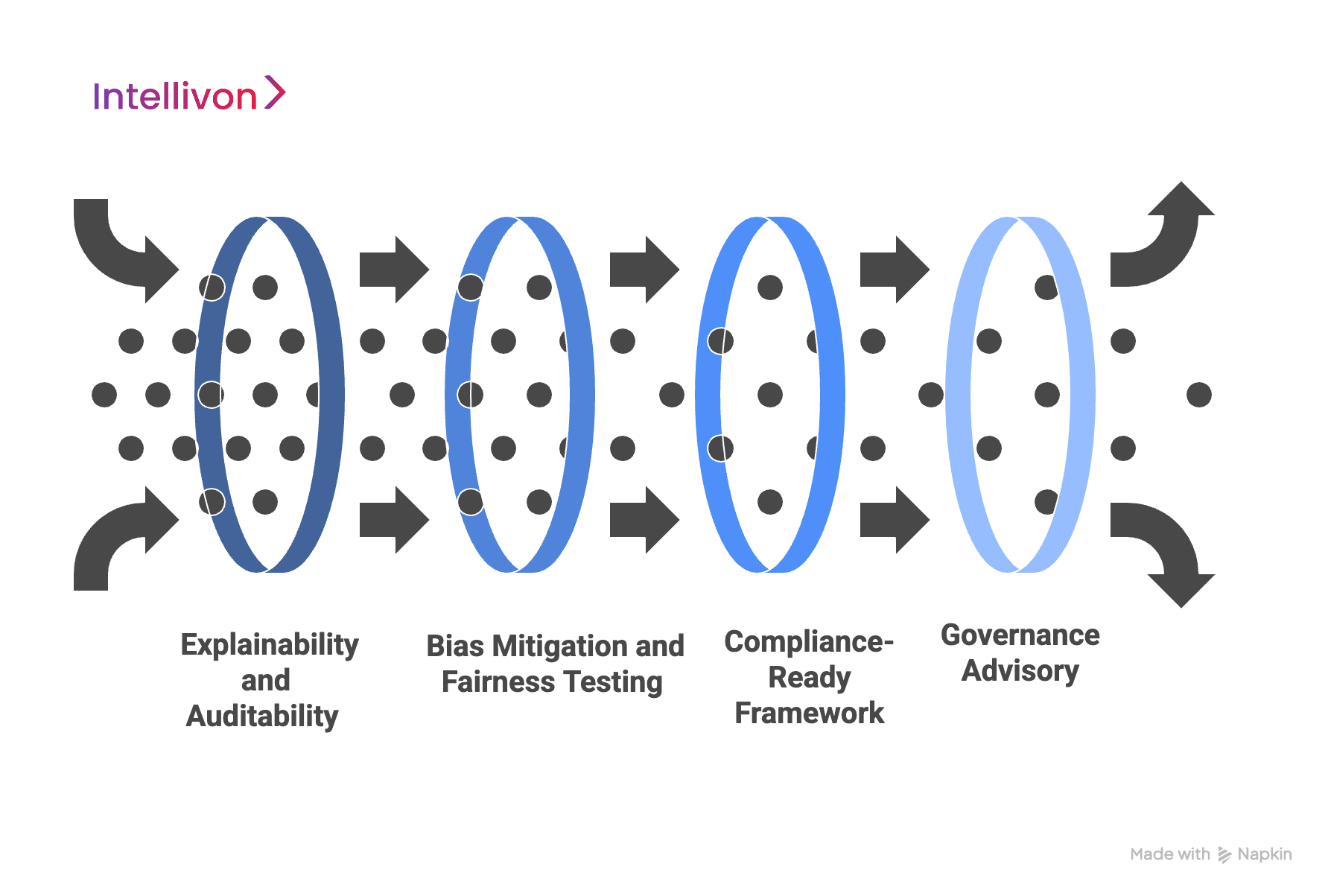
- Explainability and Auditability: AI models must be transparent, with clear documentation and audit trails, so decisions can be traced back to their source.
- Bias Mitigation and Fairness Testing: AI models should be continuously tested for fairness, ensuring that no group or individual is disproportionately harmed by the system’s decisions.
- Compliance-Ready Frameworks: Enterprises should align AI workflows with evolving global regulations and industry standards to mitigate risks associated with non-compliance.
- Governance Advisory: Defining roles and processes for managing AI operations and ensuring regular monitoring is vital to maintaining responsible AI practices.
By integrating these principles into AI workflows, we ensure enterprises can ensure their systems are not only efficient but also ethical, fostering a sense of responsibility among stakeholders while driving innovation.
Why Enterprises Need an AI Ecosystem
Building AI solutions entirely in-house is increasingly uncommon for enterprises. Instead, many businesses thrive by leveraging a robust AI ecosystem, which includes a network of cloud providers, specialized vendors, technology alliances, and integration partners.
This collaborative approach allows companies to access external expertise, utilize pre-trained models, and leverage platform-as-a-service (PaaS) offerings from industry leaders such as AWS, Azure, and Google Cloud Platform. In this way, enterprises can remain competitive while focusing on core competencies.
Strategic Partnerships
AI excellence involves a combination of regulatory knowledge, system integration, and ongoing innovation. Few organizations possess all of these capabilities internally, making strategic partnerships crucial. Working with AI specialists and technology providers offers several advantages:
- Co-Innovation and Accelerated Development: Collaborating with AI vendors and technology partners allows enterprises to tap into the latest advancements, tools, and industry-specific expertise.
- Risk Reduction: Partnerships with established AI specialists help share accountability, embed governance, and ensure compliance.
- Access to Niche Expertise and Pre-Built Solutions: Many AI providers offer pre-built models and solutions that can be easily integrated into existing systems.
- Scalability and Responsible Integration: Strategic partners ensure that AI systems are scalable, robust, and able to integrate seamlessly with existing infrastructure.
A clear example of this is IBM’s partnership with Adobe to embed generative AI into Adobe Experience Cloud. By combining IBM’s advanced AI tools and Adobe’s platform, the collaboration enabled faster, more personalized marketing campaigns. This kind of partnership demonstrates the power of pooling resources, knowledge, and technology to drive transformation.
Building and Managing a Successful AI Ecosystem
To truly maximize the value of AI, enterprises should consider establishing a connected AI ecosystem, encompassing both internal and external capabilities. Ensuring smooth integration of AI solutions with existing enterprise platforms, such as ERP, CRM, and SCM systems, ensures that AI workflows complement and enhance current operations, rather than disrupt them.
While navigating this ecosystem, it’s crucial for enterprises to focus on co-innovation and governance to ensure that AI systems remain scalable, compliant, and trustworthy. Regular tracking of business outcomes like customer satisfaction, cost efficiency, and productivity, rather than focusing solely on technical metrics, will help enterprises realize the full impact of AI solutions.
Partner With Intellivon For A Robust AI Ecosystem
At Intellivon, we understand the importance of building strong, integrated AI ecosystems. Our approach helps enterprises seamlessly connect AI solutions to their existing systems, ensuring that AI tools align with business objectives and are built on a foundation of trust, transparency, and compliance.
Through strategic partnerships and a collaborative approach, Intellivon supports businesses in maximizing the potential of their AI initiatives while navigating complex challenges.
Scaling Enterprise AI from Proof-of-Concept to Production Reality
Many enterprises are successful in building promising AI POCs, but transitioning these models to full-scale production can be challenging. The process requires a holistic approach that involves infrastructure, processes, governance, and continuous monitoring.
MLOps (Machine Learning Operations) plays a key role in this journey. MLOps brings together the practices, tools, and frameworks required for deploying, monitoring, and maintaining AI models in production. It ensures version control, continuous integration/continuous deployment (CI/CD), automated retraining, and real-time monitoring to tackle challenges like model drift, data pipeline reliability, and integration with core business systems.
Common Challenges in Scaling AI
Scaling AI from PoC to production-grade systems comes with several challenges:
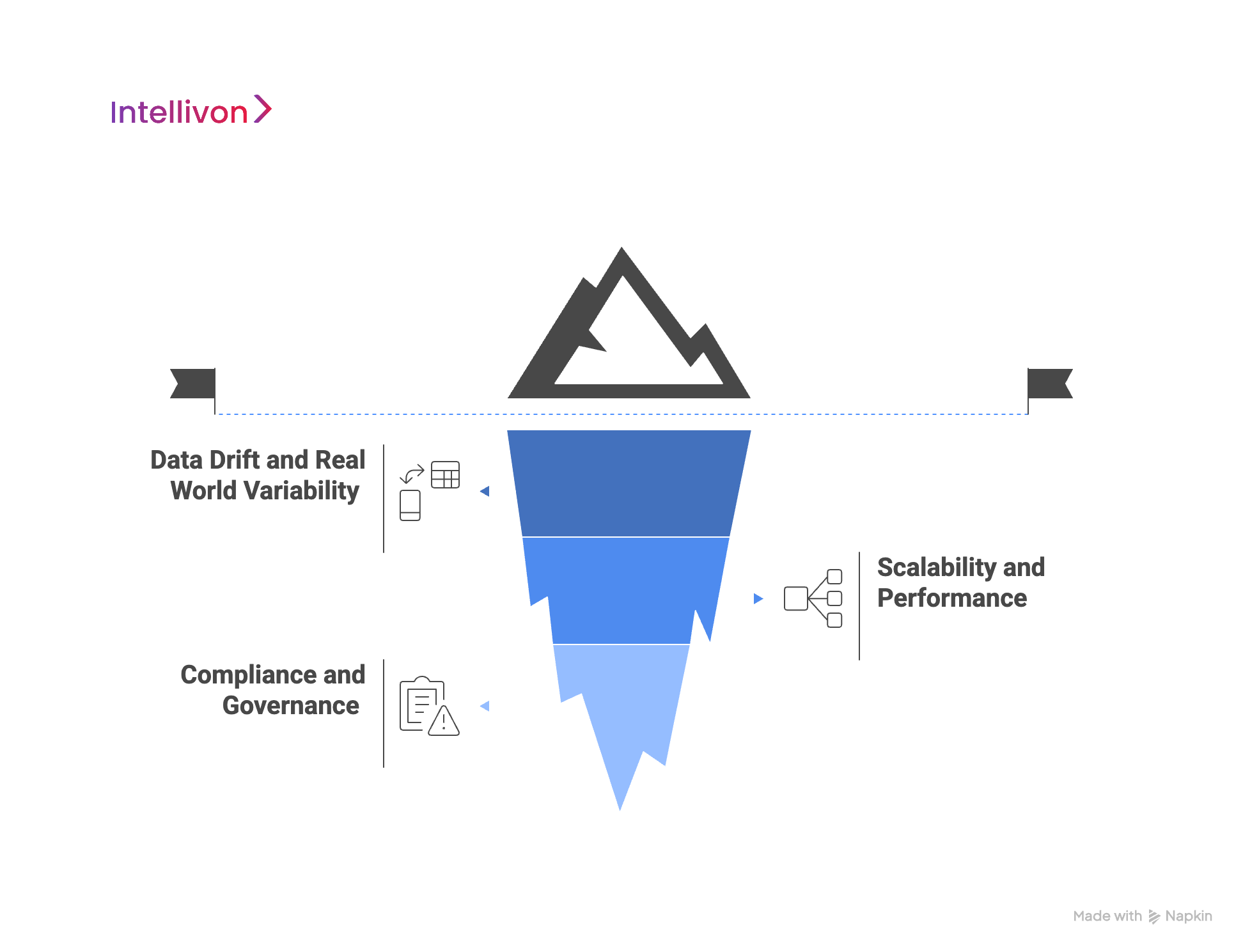
- Data Drift and Real-World Variability: Over time, AI models can lose accuracy as new, real-world data emerges. Continuous monitoring and retraining of models are essential to keep them accurate and aligned with business needs.
- Scalability and Performance: PoC models are typically tested in controlled environments, but they often struggle under the real-world load of production systems. To handle larger volumes and traffic, AI systems must be built on cloud-native architectures with robust performance testing.
- Compliance and Governance: Production-grade AI systems must adhere to regulatory standards and audit requirements. Unlike PoCs, these systems need to provide transparency, ensure data privacy, and comply with industry regulations.
How We Bridge the POC-to-Production Gap
We help enterprises bridge the gap between PoC and production by providing a proven methodology for scaling AI solutions. Our approach integrates the key components necessary for transitioning from pilot projects to full-scale deployments:
- Scalable, Cloud-Based Infrastructure: We design cloud-native AI systems that are built to scale, ensuring they can handle increased workloads without sacrificing performance.
- Automated Monitoring and Retraining: To combat data drift and ensure continuous model performance, we implement automated monitoring systems that track AI outcomes in real-time and retrain models as needed, allowing businesses to maintain accuracy as the environment evolves.
- Seamless Integration with Enterprise Systems: We ensure that AI workflows integrate smoothly with your existing business infrastructure, including CRM, ERP, and other enterprise systems. This helps ensure that AI solutions complement and enhance existing processes rather than disrupting them.
Ensuring Long-Term Success
For AI systems to be successful in the long term, they need continuous refinement. Intellivon helps enterprises adopt an iterative, ongoing improvement approach to AI. With our support, businesses can monitor performance, address any emerging issues, and scale their AI solutions responsibly. We work alongside enterprises to provide the necessary tools, governance frameworks, and expertise to help AI models evolve over time and remain effective as business needs change.
The Future of AI in Enterprise Workflows
As AI continues to evolve, enterprises are tapping into emerging trends that are shaping the next wave of intelligent, autonomous operations.
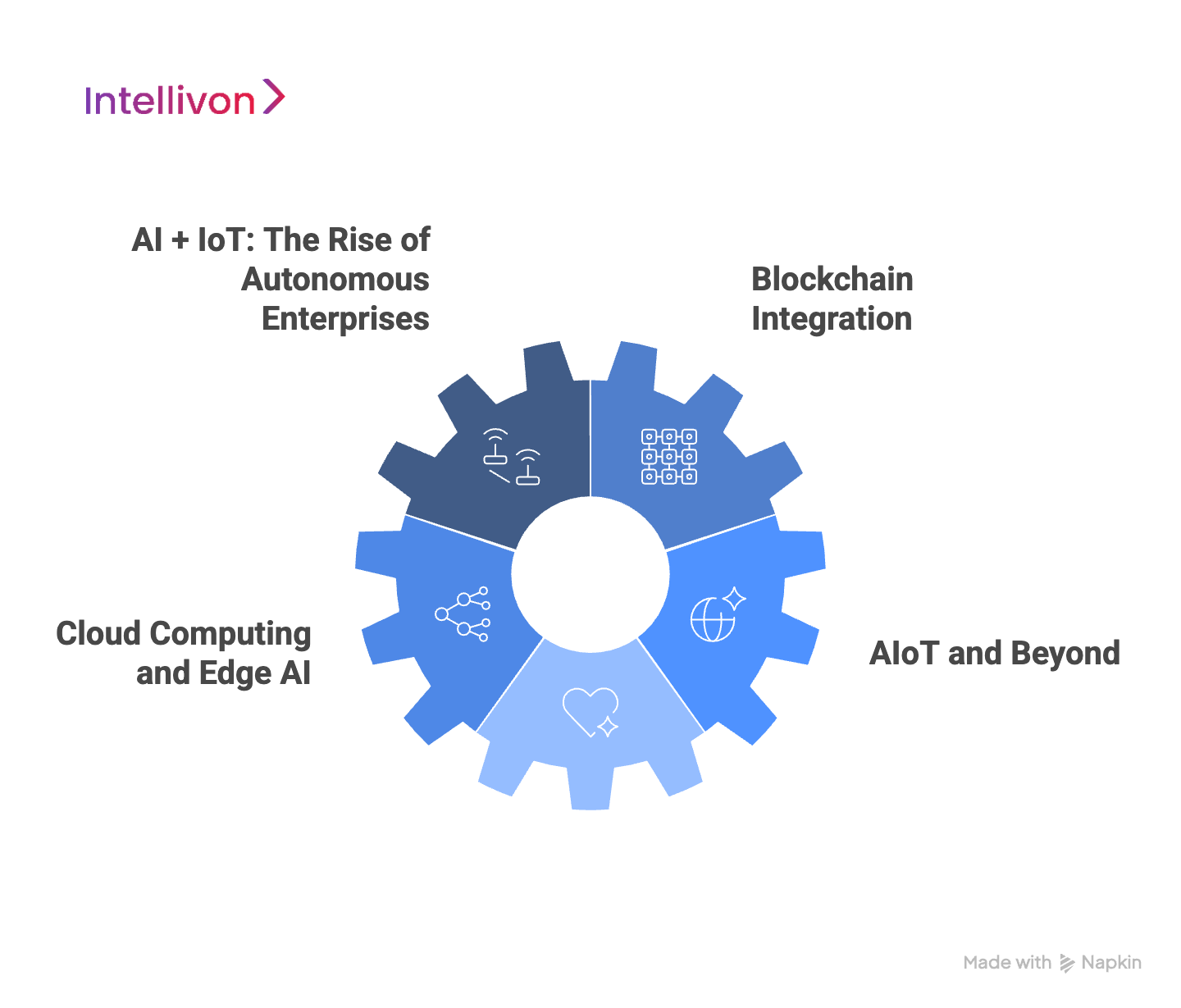
1. AI + IoT: The Rise of Autonomous Enterprises
The convergence of AI and the Internet of Things (IoT) is transforming businesses into self-optimizing organizations. IoT devices gather real-time data, while AI analyzes this information to predict outcomes and enable rapid, automated decisions. For example, predictive maintenance in manufacturing can reduce downtime by 30%, and AI-driven diagnostics in healthcare speeds up care and improves accuracy.
2. Blockchain Integration
Blockchain, paired with AI, significantly enhances security and transparency, especially in industries with strict compliance needs. Moreover, this combination ensures that AI-driven decisions are both auditable and trustworthy, particularly in finance and supply chains. As a result, businesses can gain greater accountability and integrity, ultimately improving overall reliability.
3. Cloud Computing and Edge AI
Cloud platforms like AWS, Azure, and GCP make AI accessible and scalable. As edge computing and 5G technology mature, AI will process data closer to the source, reducing latency and supporting real-time, decentralized decision-making.
4. AIoT and Beyond
The fusion of AI and IoT, known as AIoT, is a rapidly growing market. By 2030, AIoT is expected to reach $253.86 billion, enabling enterprises to automate workflows, enhance security, and gain real-time insights across industries.
At Intellivon, we envision the future of enterprise workflows as intelligent, interconnected, and autonomous. Our roadmap focuses on integrating AI with IoT, blockchain, and cloud platforms to drive automation, security, and agility.
By embracing these innovations, Intellivon empowers enterprises to reimagine their operations, deliver exceptional customer experiences, and thrive in an increasingly data-driven world.
Conclusion
Building and scaling AI workflows in enterprises requires a strategic approach that integrates advanced technologies, robust governance, and continuous adaptation. By embracing AI ecosystems, fostering key partnerships, and ensuring ethical practices, businesses can unlock new levels of automation, efficiency, and innovation.
Scale Faster with Intellivon’s AI-Driven Workflows
With 11+ years of experience in delivering cutting-edge AI solutions for pioneering enterprises, Intellivon’s pre-vetted AI experts have hands-on experience in crafting tailored AI workflows for your enterprise needs. Our experts specialize in integrating advanced AI systems into existing legacy platforms without disturbing proprietary data. Here’s why Intellivon is the partner of choice for organizations seeking measurable results and future-ready operations:
- End-to-End AI Expertise: Intellivon brings deep experience in designing, deploying, and scaling AI-powered workflows tailored to your unique business needs, ensuring seamless integration with your existing systems and processes.
- Proven Business Impact: With over 500+ AI projects deployed, our solutions consistently deliver tangible benefits, boosting productivity, reducing operational costs, and enhancing customer satisfaction.
- Cutting-Edge Technology: We leverage the latest in machine learning, natural language processing, and omnichannel automation to create adaptive, self-improving workflows that keep your business ahead of the curve.
- Seamless Integration: Intellivon’s platform integrates effortlessly with your CRMs, ERPs, communication channels, and cloud services, enabling unified data flows and real-time process optimization.
- Human-Centric Change Management: We support your teams with comprehensive training, transparent communication, and ongoing support to drive adoption and maximize ROI.
- Continuous Optimization: Intellivon doesn’t just implement and leave, we monitor, refine, and enhance your AI workflows over time, ensuring sustained performance and business value.
Ready to unlock the full potential of AI in your enterprise workflows?
Contact Intellivon today and discover how our intelligent automation solutions can transform your operations, accelerate growth, and position your business for long-term success.
FAQs
Q1. What are AI workflows and why are they important for enterprises?
A1. AI workflows automate tasks, analyze data, and make decisions, improving efficiency, reducing costs, and enhancing decision-making for enterprises.
Q2. What are the key steps to build AI workflows in enterprises?
A2. Building AI workflows involves defining objectives, identifying bottlenecks, selecting AI technologies, integrating systems, and continuous monitoring.
Q3. How do AI ecosystems and partnerships enhance AI workflows?
A3. AI ecosystems and partnerships provide external expertise, pre-trained models, and cloud platforms, accelerating innovation and simplifying AI management.
Q4. What challenges do enterprises face when scaling AI workflows?
A4. Challenges like data drift, scalability, and compliance can be addressed with MLOps, continuous monitoring, and cloud-native architectures.
Q5. How can enterprises ensure ethical AI and compliance?
A5. Enterprises ensure ethical AI by implementing governance frameworks focused on transparency, fairness, accountability, and regulatory compliance.

